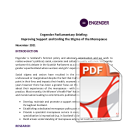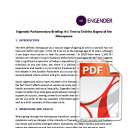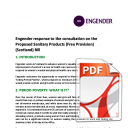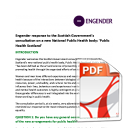Engender blog
Menopause Matters: an assessment of the support needs of Scottish women experiencing menopause transition
Engender is really pleased to be working with University of Edinburgh student Elena Rodriguez on a project exploring women's experiences of the menopause.
Born in San José, Costa Rica, Elena graduated in Medicine and Surgery from the University of Costa Rica in 2016. She has since worked researching access to healthcare for migrant and indigenous populations in Costa Rica, and on knowledge and attitudes towards flu vaccines with health professionals and postpartum women. She's been a feminist since 1990, and in her first blog for Engender, she sets out what the project hopes to do.

Biologically, the menopause is considered a natural part of ageing. Generally defined as the moment a woman stops having periods, it occurs at the average age of 51 years in the UK. However, for some women the process happens earlier - often with no apparent cause, or as a result of surgical or medical procedures, for example some cancer treatments.
The menopause transition is the period where women can experience a series of symptoms such as changes in the intensity or frequency of your periods, hot flushes, night sweats, low mood or mood changes, and anxiety, amongst others. It can begin months or even years before the menopause and last around four years after the last period, or it can begin abruptly after a surgery. The frequency and severity of the symptoms vary for each woman and depend on many different factors such as your levels of hormones, your health and family history, childhood experiences and past or current cultural conditions - such as the perceptions and expectations of the roles of middle aged women in society, of ageing and of menopause.[1]
Some of the younger readers may be asking: but why or how is this relevant for me? This will not happen to me for many years, I will worry about it later. I know this because I had the same thoughts. For those like me, I must tell you, it is relevant, to all of us, right now. Even if we are not expecting to go through this transition for “many years” there are over 400,000 women in Scotland between 50 and 59 years that are going through it and would benefit from a more empathetic and supportive environment that should be driven by all of us.
Because it has been a neglected topic in discussion around women´s reproductive and sexual life, many women do not know what to expect from this period; how to face it and, if help is required, where to ask for it. Sometimes the menopause transition, and talking about it, can be quite challenging. Each person is different and will experience it in their own way. However, there is research that suggests that the lack of information on how and where to get help and support pushes women into (preventable) ill mental health, negatively impacts their relationships with family and friends, and can affect women´s performance in workplace environments.[2][3]
The negligence is evident in the lack of individual awareness but also in the absence of policies and public knowledge about the topic. As Scotland´s population is ageing, and women continue to become more active within society, there is a duty to address menopause as a feminist issue.
As part of my dissertation project to obtain the degree of MSc. in Global Health Policy from the University of Edinburgh, and due to Engender’s interest in understanding the needs of Scottish women going through the menopause transition to develop policies that can address them, we are working together. We are developing a study to identify the support needs of Scottish women experiencing the menopause transition and map the existing support services and policies to guide future recommendations to improve them or create new ones.
We want to identify the gaps between what women say they need and the existing services and policies so that future efforts honestly answer to women´s voices. The study will include an online survey for women and interviews with key stakeholders involved in providing support services or developing policies in Scotland. Hopefully, with the participation of all of you, we can improve women´s experiences of menopause and the menopause transition.
-------
[1] NHS. Menopause [Internet]. nhs.uk. 2017 [accessed 2019 Apr 30]. Available from: https://www.nhs.uk/conditions/menopause/.
[2] Hoga L, Rodolpho J, Gonçalves B, Quirino B. Women’s experience of menopause: a systematic review of qualitative evidence. The JBI Database of Systematic Reviews and Implementation Reports. 2015 Sep;13(8):250–250.
[3] Brewis J, Beck V, Davies A, Matheson J. The effects of menopause transition on women’s economic participation in the UK [Internet]. Government Equalities Office; 2017 Jul. Available from: https://www.gov.uk/government/publications/menopause-transition-effects-on-womens-economic-participation.
Share this post on …
Comments: 0 (Add)
Downloads
 Engender Briefing to the Women’s Health Plan: What Do Women Experiencing the Menopause in Scotland Need?
In 2020, the Women’s Health Plan was established with a remit of raising awareness around women’s health; improving access to healthcare for women across the life course and reducing inequalities in health outcomes for girls and women, including gender-based inequalities both for sex-specific conditions and in women’s general health.
Engender Briefing to the Women’s Health Plan: What Do Women Experiencing the Menopause in Scotland Need?
In 2020, the Women’s Health Plan was established with a remit of raising awareness around women’s health; improving access to healthcare for women across the life course and reducing inequalities in health outcomes for girls and women, including gender-based inequalities both for sex-specific conditions and in women’s general health.
 Engender Parliamentary Briefing: Improving Support and Ending the Stigma of the Menopause
This is a briefing for MSPs ahead of the Member's Business Session on Improving Support and Ending the Stigma of the Menopause.
Engender Parliamentary Briefing: Improving Support and Ending the Stigma of the Menopause
This is a briefing for MSPs ahead of the Member's Business Session on Improving Support and Ending the Stigma of the Menopause.
 Engender Parliamentary Briefing: It’s Time to End the Stigma of the Menopause
This briefing was written for a debate in the Scottish Parliament (S5M-17347: It’s Time to End the Stigma of the Menopause), exploring women's experiences of the menopause in Scotland.
Engender Parliamentary Briefing: It’s Time to End the Stigma of the Menopause
This briefing was written for a debate in the Scottish Parliament (S5M-17347: It’s Time to End the Stigma of the Menopause), exploring women's experiences of the menopause in Scotland.
 Engender Response to the Public Consultation on the Proposed Sanitary Products (Free Provision) (Scotland) Bill
Engender welcomes the opportunity to respond to Monica Lennon MSP consultation titled ‘Ending Period Poverty’, which proposes to introduce a Bill in the Scottish Parliament which would provide women and girls with access to free menstrual products.
Engender Response to the Public Consultation on the Proposed Sanitary Products (Free Provision) (Scotland) Bill
Engender welcomes the opportunity to respond to Monica Lennon MSP consultation titled ‘Ending Period Poverty’, which proposes to introduce a Bill in the Scottish Parliament which would provide women and girls with access to free menstrual products.
 Engender response to the Scottish Government consultation on a new National Public Health body: 'Public Health Scotland'
Engender welcomes this Scottish Government consultation on proposals for Scotland’s new national public health body, Public Health Scotland.
Engender response to the Scottish Government consultation on a new National Public Health body: 'Public Health Scotland'
Engender welcomes this Scottish Government consultation on proposals for Scotland’s new national public health body, Public Health Scotland.
 Our bodies our rights - Identifying and removing barriers to disabled women's reproductive rights in Scotland
Since 2013, Engender has been working with disabled women and disabled people’s organisations on a project to discuss the key issues facing women and girls in Scotland, and to enable a deeper and richer conversation about reproductive rights.
Our bodies our rights - Identifying and removing barriers to disabled women's reproductive rights in Scotland
Since 2013, Engender has been working with disabled women and disabled people’s organisations on a project to discuss the key issues facing women and girls in Scotland, and to enable a deeper and richer conversation about reproductive rights.
 Summary of 'Period Poverty' in Scotland Roundtable
In June 2017 Engender held a roundtable discussion to gain a better understanding of ’period poverty’ in Scotland: the issue of women not having adequate access to sanitary products.
Summary of 'Period Poverty' in Scotland Roundtable
In June 2017 Engender held a roundtable discussion to gain a better understanding of ’period poverty’ in Scotland: the issue of women not having adequate access to sanitary products.

Newsletter
Sign up to receive our newsletter here:
Sign up to our mailing list
Receive key feminist updates direct to your inbox: